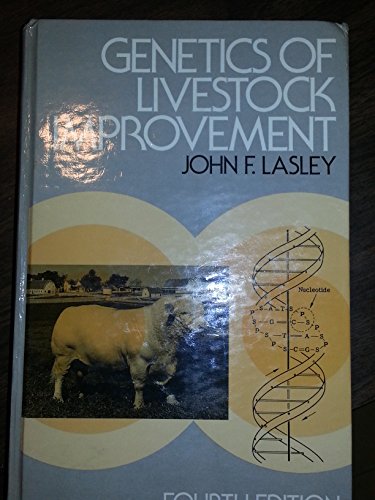Climate-Resilient Livestock Breeding And Genetics Improvement
In recent years, genetics has played a crucial role in improving livestock. Farmers have witnessed significant advancements in breeding techniques, resulting in superior animal quality and productivity. This article dives into the fascinating world of livestock genetics, exploring the various aspects and advancements in this field.
Genetics serves as the foundation for livestock improvement, allowing farmers to selectively breed animals with desirable traits. Through careful selection and genetic engineering, farmers can produce offspring that possess superior characteristics, such as increased milk production, higher meat yields, improved disease resistance, and enhanced overall productivity.
Advancements in genetics have revolutionized the livestock industry by providing farmers with tools to enhance the quality and performance of their herds. Techniques such as artificial insemination, embryo transfer, and genetic screening have become common practices in modern livestock management. Let's delve deeper into the world of livestock genetics and its significance in farm operations.
What is Livestock Genetics?
Livestock genetics refers to the branch of genetics that involves the manipulation and study of genes in farm animals. It focuses on understanding and improving the genetic traits of animals to optimize desirable characteristics. Through the application of genetic principles and techniques, farmers can selectively breed animals to achieve specific goals, such as increased milk production or disease resistance.
Ideas For Livestock Genetics Improvement
1. Selective Breeding: Breeders can study the genetic makeup of animals and select individuals with desirable traits as parents for the next generation. By repeating this process over several generations, breeders can gradually enhance specific characteristics in the livestock population.
2. Genetic Engineering: Advanced techniques such as gene editing can be used to introduce specific traits or modify existing ones in animals. This approach offers precise control over genetic outcomes, enabling breeders to develop livestock with improved attributes.
3. Artificial Insemination (AI): AI involves the collection and storage of semen from high-quality male animals. By inseminating females with this semen, farmers can ensure the reproduction of superior genetics and the passing on of desirable traits to the offspring.
4. Embryo Transfer: This technique allows for the transfer of embryos from genetically superior females to recipient females. It enables the multiplication of elite genetics, allowing farmers to increase the number of offspring from high-quality animals.
Recommendations For Implementing Livestock Genetics
1. Collaboration with Genetic Experts: Farmers should consider working in collaboration with genetic experts, such as animal geneticists or veterinarians, who can provide guidance on the selection of suitable breeding candidates and help implement genetic improvement programs.
2. Data Collection and Analysis: Accurate data collection on animal traits, performance, and pedigree is crucial for effective genetic improvement. Farmers should implement systems to collect and analyze data, enabling them to make informed decisions based on the animals' genetic potential.
3. Embracing Technology: Livestock genetic improvement heavily relies on technology. Farmers should invest in technologies such as genetic testing, artificial insemination, and electronic record systems to optimize their breeding programs.
4. Continuous Learning: The field of livestock genetics is constantly evolving. Farmers should stay updated with the latest research, techniques, and advancements in genetic improvement to ensure their breeding programs remain at the forefront of the industry.
Listicle of Genetic Advancements in Livestock Improvement
1. Genome Sequencing: The ability to sequence animal genomes has revolutionized the field of livestock genetics. It allows researchers to identify specific genes responsible for desirable traits and develop breeding programs accordingly.
2. Marker-Assisted Selection (MAS): MAS involves using DNA markers to predict an animal's genetic potential. This technique enables farmers to make informed decisions about breeding candidates without relying solely on physical traits.
3. Genomic Selection: Genomic selection utilizes genome-wide DNA markers to predict an animal's genetic merits accurately. It enables breeders to make faster progress by selecting superior animals at a young age, saving time and resources compared to traditional selection methods.
4. Embryo Sexing: The ability to determine the sex of embryos before implantation allows breeders to choose the desired gender. This technology has been particularly crucial in the dairy industry, as it enables farmers to focus on producing heifers for future milk production.
5. Cloning: Cloning technology has opened up new avenues for the replication of elite genetics. By producing genetically identical copies of high-performing animals, farmers can accelerate genetic progress and preserve valuable genetics.
Question & Answer
Q: How long does it take to see the effects of genetic improvement in livestock?
A: The time required to see the effects of genetic improvement depends on various factors, such as the generation interval and the specific trait being targeted. In some cases, significant improvements can be observed within a few generations, while others may take several years to manifest.
Q: Are there any ethical concerns related to genetic improvement in livestock?
A: Ethical concerns regarding genetic improvement in livestock primarily revolve around the use of advanced reproductive technologies, such as cloning or genetic modification. It is crucial for farmers and researchers to consider the ethical implications and ensure the well-being and welfare of the animals being genetically manipulated.
Q: Can livestock genetics help in improving sustainability in farming?
A: Yes, livestock genetics can contribute to improving sustainability in farming. By breeding animals with increased disease resistance, feed efficiency, and productivity, farmers can reduce the need for antibiotics, lower environmental impact, and optimize resource utilization.
Summary
Advancements in livestock genetics have provided farmers with powerful tools to improve the quality and productivity of their herds. Through selective breeding, genetic engineering, and the use of advanced reproductive technologies, farmers can enhance desirable characteristics in their livestock populations. Collaboration with genetic experts, data collection and analysis, and embracing technological advancements are crucial for successful implementation of livestock genetic improvement programs. With ongoing research and developments, the field of livestock genetics continues to push the boundaries of what is possible, enabling farmers to optimize their operations and contribute to a more sustainable future.

Post a Comment for "Climate-Resilient Livestock Breeding And Genetics Improvement"